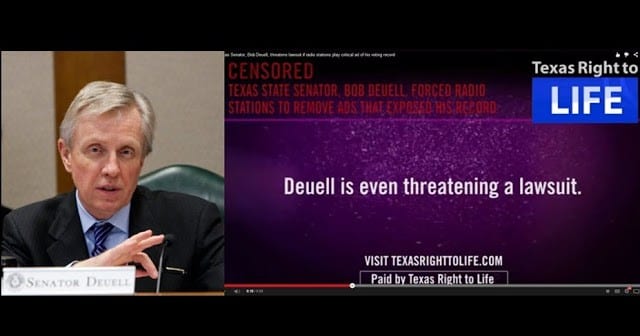Last fall, Texas Right to Life filed a civil suit against a defeated legislator, Bob Deuell, who lost his re-election bid in the 2014 Republican Primary Election. The outcome of this lawsuit will widely impact political advocacy, including the ways third parties support or oppose candidates, campaigns are managed, and how individual citizens can express support for or opposition to candidates.
During the 2014 Republican Primary May Runoff Election that followed the March Primary Election, Texas Right to Life aired radio spots about Deuell’s aggressive promotion of legislation (Senate Bill 303) in 2013 that would have expanded the power of hospital committees over the lives of disabled patients. Texas Right to Life and every major conservative Texas organization vigorously and successfully opposed this deadly legislation, authored by Deuell.
Scorned and embarrassed, Deuell attempted to silence Texas Right to Life, sending threats of litigation through cease-and-desist letters to the media outlets with which Texas Right to Life had contracted to air the ads. Using one’s political or public office to censor a message about legislative actions is an abuse of power, not to mention desperate. If anyone can interfere with the contract of two other parties for supercilious reasons, then all contracts between all parties about any matter are unsound.
While Texas Right to Life attorneys and the attorneys of the radio stations collaborated to resume airing the legal and true ads, Deuell indeed succeeded in bullying these stations and silencing Texas Right to Life for two days by interfering with our contract with the radio stations. Two days is a political eternity—crucial air-time during a condensed primary runoff election time, particularly for an election drawing so much attention.
Yet when listeners in Senate District 2 learned that Deuell, a doctor, sided with the medical lobby in allowing hospitals to deny life-sustaining care to patients, the voters ousted Deuell and elected a new state senator who shared their views on honoring medical decisions of patients.
Nevertheless, Texas Right to Life recognized that other officeholders could (and probably do) use Deuell’s intimidation tactics; therefore, Texas Right to Life filed suit against Deuell over a year ago for tortious interference with our contracts with the radio stations. At the preliminary hearing this past June, the other issues at stake were clarified: not only contract interference, but also the right to free speech, unconstitutional limits on campaign advocacy, abuse of power, ethical behavior of an office-holder, and many more that could even impact the innocuous posts of private citizens on social media.
If Deuell’s position is accepted, Texas campaigns and political activity will significantly change – and not for the better. In order to stop a message that a candidate does not want publicized, the candidate would simply need to send this menacing statement from a lawyer to the targeted media outlet: “This letter is sent in contemplation of a legal proceeding.” The newspaper editorial, Facebook post, or radio or TV ad featuring an unpleasant message can be banned and censored with no responsibility on the candidate. The silenced organization or individual would not even be free to tell the electorate that they were threatened with possible litigation, thereby heightening the existing entry barrier to protect the establishment ruling class.
This case is far bigger than Texas Right to Life making an example out of a failed moderate politician and his defeated policies.
Texas Right to Life was legally incorporated in 1973 primarily to stop abortion and speak for the defenseless. We cannot speak for the defenseless and voiceless if our right to free speech, including communicating that which politicians and institutions prefer not be said, is stifled, limited, and eroded by incumbents and courts.
We will always speak loudly and aggressively for those who have no voice, including Pro-Life voters whose elected representatives no longer speak for them.


